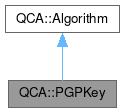QCA::PGPKey
#include <QtCrypto>

Public Member Functions | |
| PGPKey () | |
| PGPKey (const PGPKey &from) | |
| PGPKey (const QString &fileName) | |
| QDateTime | creationDate () const |
| QDateTime | expirationDate () const |
| QString | fingerprint () const |
| bool | inKeyring () const |
| bool | isNull () const |
| bool | isSecret () const |
| bool | isTrusted () const |
| QString | keyId () const |
| PGPKey & | operator= (const PGPKey &from) |
| QString | primaryUserId () const |
| QByteArray | toArray () const |
| bool | toFile (const QString &fileName) const |
| QString | toString () const |
| QStringList | userIds () const |
 Public Member Functions inherited from QCA::Algorithm Public Member Functions inherited from QCA::Algorithm | |
| Algorithm (const Algorithm &from) | |
| void | change (const QString &type, const QString &provider) |
| void | change (Provider::Context *c) |
| Provider::Context * | context () |
| const Provider::Context * | context () const |
| Algorithm & | operator= (const Algorithm &from) |
| Provider * | provider () const |
| Provider::Context * | takeContext () |
| QString | type () const |
Static Public Member Functions | |
| static PGPKey | fromArray (const QByteArray &a, ConvertResult *result=nullptr, const QString &provider=QString()) |
| static PGPKey | fromFile (const QString &fileName, ConvertResult *result=nullptr, const QString &provider=QString()) |
| static PGPKey | fromString (const QString &s, ConvertResult *result=nullptr, const QString &provider=QString()) |
Additional Inherited Members | |
 Protected Member Functions inherited from QCA::Algorithm Protected Member Functions inherited from QCA::Algorithm | |
| Algorithm () | |
| Algorithm (const QString &type, const QString &provider) | |
Detailed Description
Pretty Good Privacy key.
This holds either a reference to an item in a real PGP keyring, or a standalone item created using the from*() functions.
Note that with the latter method, the key is of no use besides being informational. The key must be in a keyring (that is, inKeyring() == true) to actually do crypto with it.
Definition at line 2406 of file qca_cert.h.
Constructor & Destructor Documentation
◆ PGPKey() [1/3]
| QCA::PGPKey::PGPKey | ( | ) |
Create an empty PGP key.
◆ PGPKey() [2/3]
| QCA::PGPKey::PGPKey | ( | const QString & | fileName | ) |
◆ PGPKey() [3/3]
| QCA::PGPKey::PGPKey | ( | const PGPKey & | from | ) |
Standard copy constructor.
- Parameters
-
from the PGPKey to use as the source
Member Function Documentation
◆ creationDate()
| QDateTime QCA::PGPKey::creationDate | ( | ) | const |
The creation date for the key.
◆ expirationDate()
| QDateTime QCA::PGPKey::expirationDate | ( | ) | const |
The expiration date for the key.
◆ fingerprint()
| QString QCA::PGPKey::fingerprint | ( | ) | const |
The key fingerpint.
This will return the PGP fingerprint as a string. It comprises 40 hex digits, without spaces.
◆ fromArray()
|
static |
Import the key from an array.
- Parameters
-
a the array to import from result if not null, this will be set to the result of the import process provider the provider to use, if a particular provider is required
◆ fromFile()
|
static |
Import the key from a file.
- Parameters
-
fileName string containing the name of the file to import from result if not null, this will be set to the result of the import process provider the provider to use, if a particular provider is required
◆ fromString()
|
static |
Import the key from a string.
- Parameters
-
s the string to import from result if not null, this will be set to the result of the import process provider the provider to use, if a particular provider is required
◆ inKeyring()
| bool QCA::PGPKey::inKeyring | ( | ) | const |
Test if this key is in a keyring.
- Returns
- true if the key is in a keyring
- Note
- keys that are not in a keyring cannot be used for encryption, decryption, signing or verification
◆ isNull()
| bool QCA::PGPKey::isNull | ( | ) | const |
Test if the PGP key is empty (null)
- Returns
- true if the PGP key is null
◆ isSecret()
| bool QCA::PGPKey::isSecret | ( | ) | const |
Test if the PGP key is the secret key.
- Returns
- true if the PGP key is the secret key
◆ isTrusted()
| bool QCA::PGPKey::isTrusted | ( | ) | const |
Test if the key is trusted.
- Returns
- true if the key is trusted
◆ keyId()
| QString QCA::PGPKey::keyId | ( | ) | const |
The Key identification for the PGP key.
◆ operator=()
Standard assignment operator.
- Parameters
-
from the PGPKey to use as the source
◆ primaryUserId()
| QString QCA::PGPKey::primaryUserId | ( | ) | const |
The primary user identification for the key.
◆ toArray()
| QByteArray QCA::PGPKey::toArray | ( | ) | const |
◆ toFile()
| bool QCA::PGPKey::toFile | ( | const QString & | fileName | ) | const |
Export the key to a file.
- Parameters
-
fileName the name of the file to save the key to
◆ toString()
| QString QCA::PGPKey::toString | ( | ) | const |
Export the key to a string.
This will export the key in an "ascii armoured" form.
- See also
- fromString for a static import method.
- toArray for a binary format export method.
◆ userIds()
| QStringList QCA::PGPKey::userIds | ( | ) | const |
The list of all user identifications associated with the key.
The documentation for this class was generated from the following file:
Documentation copyright © 1996-2025 The KDE developers.
Generated on Fri May 2 2025 12:01:48 by doxygen 1.13.2 written by Dimitri van Heesch, © 1997-2006
KDE's Doxygen guidelines are available online.